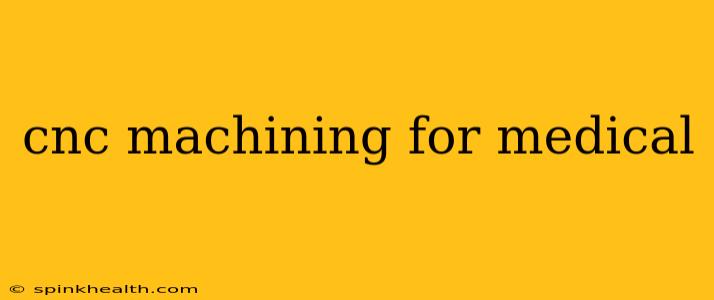The whirring of CNC machines, a symphony of controlled precision, plays a crucial role in the modern medical landscape. From intricate surgical instruments to life-saving implants, CNC machining is no longer just a manufacturing process; it's a cornerstone of medical innovation. This isn't just about speed and efficiency; it's about crafting components with unparalleled accuracy and purity, ensuring the safety and well-being of patients worldwide.
My journey into this fascinating world began years ago, witnessing firsthand the transformation of raw material into components that directly impact human lives. The meticulous detail, the unwavering commitment to quality, and the unwavering focus on safety – these elements form the heart of CNC machining for medical applications.
What Materials are Commonly Used in CNC Machining for Medical Devices?
The choice of material is paramount. It's not just about strength and durability; biocompatibility is crucial. We're talking about materials that won't react negatively with the human body. Some of the most common materials include:
- Titanium: Known for its exceptional strength-to-weight ratio and biocompatibility, titanium is a favorite for implants and surgical instruments. Its resistance to corrosion is also a significant advantage.
- Stainless Steel: Various grades of stainless steel, particularly those with high corrosion resistance, are used extensively in medical device manufacturing. They're robust and relatively inexpensive compared to other options.
- Cobalt-Chrome Alloys: These alloys offer excellent strength and wear resistance, making them ideal for components subjected to high stress and friction, like hip and knee implants.
- PEEK (Polyetheretherketone): A high-performance polymer, PEEK offers excellent biocompatibility, chemical resistance, and sterilizability, suitable for various implants and surgical instruments.
- Medical-Grade Plastics: A range of plastics, carefully selected for their biocompatibility and sterilizability, are used in various medical devices, from housings to disposable components.
What are the Advantages of CNC Machining for Medical Devices?
The precision and repeatability offered by CNC machining are unmatched. This translates to:
- High Accuracy and Tolerances: CNC machining allows for the creation of components with incredibly tight tolerances, essential for the proper functioning of medical devices.
- Complex Geometries: The ability to machine complex shapes and features enables the creation of intricate devices tailored to specific needs.
- Reproducibility: CNC machining ensures consistency and reproducibility, vital for manufacturing large quantities of identical components.
- Surface Finish: CNC machining can achieve a variety of surface finishes, from highly polished to roughened textures, depending on the application's requirements. This is important for both functionality and biocompatibility.
- Customization: CNC machining can be readily adapted to produce customized devices or components tailored to individual patient needs.
How is CNC Machining Used in Different Medical Applications?
The applications are vast and varied:
- Orthopedic Implants: Hip replacements, knee replacements, and other orthopedic implants often rely heavily on CNC machining for the precision required.
- Surgical Instruments: From delicate scalpels to complex robotic surgical tools, CNC machining ensures the necessary accuracy and durability.
- Dental Implants: The precise fit and finish of dental implants are largely due to the capabilities of CNC machining.
- Medical Imaging Equipment: Components for MRI, CT, and other medical imaging devices often benefit from the precision of CNC machining.
- Biomedical Research: CNC machining plays a crucial role in creating specialized tools and components for biomedical research.
What are the Challenges of CNC Machining for Medical Devices?
While CNC machining offers significant advantages, there are also challenges:
- Material Selection: Choosing the right biocompatible material is critical and requires careful consideration.
- Sterilization: Medical devices must undergo rigorous sterilization processes without compromising their integrity or functionality.
- Cost: The high precision and specialized equipment involved can make CNC machining a relatively expensive process.
- Regulatory Compliance: Medical device manufacturing is heavily regulated, requiring adherence to strict quality control and documentation standards.
What are the future trends in CNC machining for medical devices?
The future of CNC machining in medical device manufacturing looks bright, with ongoing advancements in:
- Additive Manufacturing (3D Printing): Integration of additive manufacturing techniques with CNC machining allows for even greater design flexibility and customization.
- Automation and Robotics: Increased automation will improve efficiency and reduce production costs.
- Advanced Materials: The development of new biocompatible materials with enhanced properties will further expand the capabilities of CNC machining.
- Smart Manufacturing: Integration of data analytics and AI will optimize the manufacturing process and improve quality control.
The precision and purity demanded by the medical industry require more than just skilled operators and advanced machines. It requires a commitment to excellence, a relentless pursuit of perfection, and an unwavering focus on the well-being of those who will ultimately benefit from the fruits of this technology. The future of healthcare, in many ways, is being shaped, one carefully machined component at a time.

